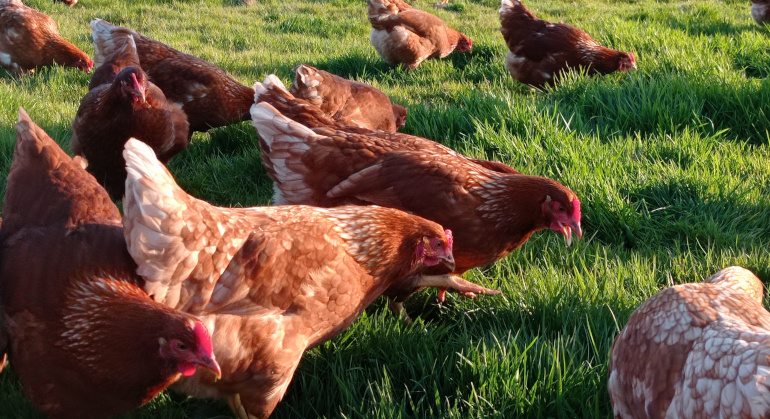


Free-range eggs are eggs produced by hens that are allowed to roam freely outdoors for at least part of the day, as opposed to being confined to cages or enclosures with limited space. The term "free-range" refers to the farming method used to raise the hens, which allows them access to outdoor spaces where they can engage in natural behaviors such as foraging, scratching, and pecking at the ground.
Free-range hens have access to the outdoors, although the specifics of this access can vary. Some hens may be free to roam in large, open pastures, while others might have access to smaller, fenced outdoor areas. The time spent outdoors can also differ, with some hens having access only during daylight hours and others for longer periods.
The ability to engage in natural behaviors is a key feature of free-range farming. Hens can forage for insects, plants, and seeds, which can contribute to their overall health and well-being. These activities can also influence the nutritional content of the eggs, with some studies suggesting that free-range eggs may have higher levels of certain nutrients, such as omega-3 fatty acids and vitamins A and E.
When not outdoors, free-range hens are typically housed in barns or shelters with perches, nesting boxes, and more space than what is provided in conventional caged systems. This housing allows for better movement and social interaction among the hens.
While free-range hens forage for some of their food outdoors, they are also typically fed a balanced diet of grains, seeds, and other nutrients to ensure consistent egg production. The diet can vary depending on the farm and the availability of natural food sources.
One of the primary benefits of free-range farming is the improvement in animal welfare. Free-range hens generally live in more humane conditions, with the ability to move around freely and engage in behaviors that are natural to their species.
Some research suggests that free-range eggs may have a richer nutritional profile compared to conventional eggs. For example, free-range eggs might contain higher levels of omega-3 fatty acids, which are beneficial for heart health, and antioxidants such as vitamin E. The exact nutritional content can vary depending on the hens' diet and environment.
Many consumers believe that free-range eggs have a superior taste and quality, often describing the yolks as more flavorful and richer in color. This perception can be linked to the varied diet and natural living conditions of free-range hens.
Free-range farming practices can be more sustainable than conventional caged systems, as they often involve better land use and management. However, the environmental impact can vary widely depending on the specific farming practices and the scale of production.
The definition of "free-range" can vary by country and even within regions, depending on local regulations. In the United States, for example, the USDA defines free-range eggs as those produced by hens that have "continuous access to the outdoors during their production cycle," but the specifics of what constitutes "outdoors" and the quality of that outdoor space are not strictly regulated. In the European Union, free-range eggs must come from hens that have continuous daytime access to outdoor runs that are mainly covered with vegetation, among other requirements.
Free-range eggs typically cost more than conventional eggs due to the higher costs associated with maintaining free-range farming conditions. However, many consumers are willing to pay the premium for the perceived benefits in animal welfare, taste, and nutrition.
It’s important for consumers to understand the labeling on egg cartons, as terms like "free-range," "pasture-raised," and "organic" are often used interchangeably or alongside each other. Each term has specific implications for how the hens are raised and what they are fed.
Free-range eggs offer a more humane and natural way of raising hens, with potential benefits in terms of nutrition and taste. While they are generally more expensive than conventional eggs, many consumers choose free-range eggs for the perceived benefits to animal welfare and product quality. However, the specifics of what "free-range" entails can vary, making it important for consumers to be informed about the standards and practices behind the label.